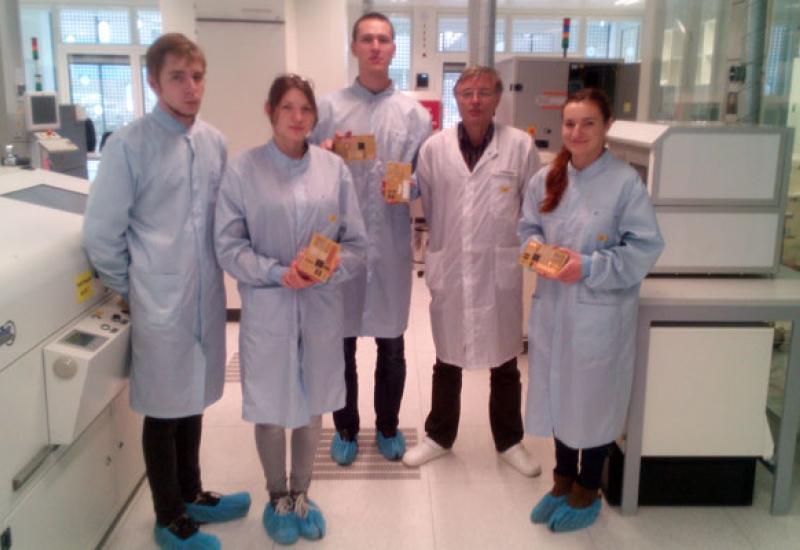From October 11 to October 24, a group of students of the Faculty of Electronics (Departments of microelectronics, electronic appliances and devices) was at the Dresden Technical University (Germany) on educational and technological practice (under the Agreement on a double diploma between NTUU"KPI" and TU Dresden). The German Academic Exchange Service (DAAD) supported the trip.
Our students performed various laboratory studies in the laboratory of the Institute of engineering compounds and packaging in electronics at the Faculty of electrical and computer engineering. Prof. Klaus-Jürgen Wolter was their curator. He was one of the originator the "Dual Degree" program. Now prof. K.-Y. Voltaire gave the leadership of the Institute engineering compounds and packaging technology in electronics to Professor Karlheinz Bock. The new Head of the Institute reacted favorably to the acquisition of new knowledge by KPI students. He expressed a desire to continue to develop contacts and to identify research topics that would be of interest to both sides and could be basis for joint scientific and technical projects.
Students FE could clearly see the performance and effectiveness of the "Dual Degree". After all, former students of the FE, which has already received a degree in TU of Dresden or perform research on Master or PhD programs, were the leaders of individual laboratory exercises in the laboratories of the University and organizers of the visit to the Fraunhofer Institute. Faculty of Electronics can be proud of its graduates Natalia Panchenko and Juliana Beschasnaya. They received the PhD degree in TU Dresden, and now lead groups of researchers: Yu.Panchenko in the Fraunhofer Institute for Reliability and micro integration and N.Beschasnaya in Fraunhofer-Institut of ceramic technology and systems. In addition, Yu.Panchenko is the youngest professor of TU Dresden!
It is a pity that in Ukraine these capable, talented researchers cannot work in such conditions and on such equipment, that they have been provided in the TU Dresden and the Fraunhofer-Institute. However, they contribute to conducting workshops for our students; provide suggestions for the implementation of master works on the subject, agreed with the German side. Their willingness to carry out joint scientific and technical research opens the way for the deepening of scientific and technical cooperation between scientists of Germany and Ukraine, real integration NTUU "KPI" in European educational and scientific space.
One should recall the graduates of the electronic devices FE: Osmolovsky Sergey, who currently performs work in PhD TU Dresden; Taras Chapny, conducting research in the Fraunhofer-Institute in polarization microscopy; Michael Kirichenko, under the leadership of former graduate Roland Heinze CPD conducts research in the laboratory ultrasonic diagnosis TU Dresden.
Department of Microelectronics also delegated in Germany Irina Patsera and Tatiana Wojciechowski, who successfully conduct research in the laboratories of the TU Dresden, acquire new knowledge and professional experience, and at the same time assert authority NTUU "KPI" in Europe.
Andrew Vlasyuk, student 5th year FE, dep. electronic devices. I was abroad first time. This travel was impressive, eventful and full of new knowledge. It is rare opportunity to see inside other technology, teaching methods, other mentality, if you like. So I happily agreed, when the TU Dresden invites students KPI on scientific educational practice.
Within two weeks, we performed laboratory works - produced by various technological methods multilayer chips, connect them to the ceramic substrate with silver wires. We took part in producing of electronic boards, installed components using automated positioning, wave and pattern-Paste Solder, studied ways to control the quality of the soldering (X rays tomography and acoustic microscopy, metallography), saw the thick-film technology coating conductive layers on the ceramic substrate and the use of it as a board. We analyzed the processes and causes of defects, made suggestions to improve the technology. We visited two research institutes Fraunhofer, acquainted with the projects on which work there, methods of solving scientific problems, visited the clean room where the silicon crystals are preparing for their further use in the industry.
It is hard to put into words how much new and better, but open to science I saw during this trip, how many got the impression from the scientific and cultural programs in Dresden, Germany remarkable historical gem. I want to thank the people who provide the cooperation from both the NTUU"KPI", and from the TU Dresden, for the opportunity to gain invaluable experience and knowledge.

